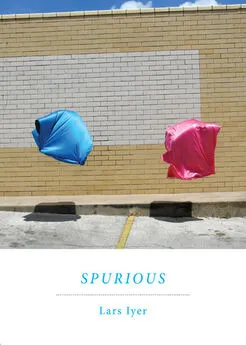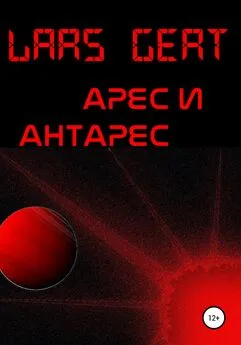Lars Iyer - Spurious
- Название:Spurious
- Автор:
- Жанр:
- Издательство:Melville House
- Год:2011
- ISBN:нет данных
- Рейтинг:
- Избранное:Добавить в избранное
-
Отзывы:
-
Ваша оценка:
Lars Iyer - Spurious краткое содержание
In a raucous debut that summons up Britain's fabled Goon Squad comedies, writer and philosopher Lars Iyer tells the story of someone very like himself with a "slightly more successful" friend and their journeys in search of more palatable literary conferences and better gin. One reason for their journeys: the narrator's home is slowly being taken over by a fungus that no one seems to know what to do about.
Before it completely swallows his house, the narrator feels compelled to solve some major philosophical questions (such as "Why?") and the meaning of his urge to write, as well as the source of the fungus… before it is too late. Or, he has to move.
Spurious - читать онлайн бесплатно полную версию (весь текст целиком)
Интервал:
Закладка:
Then there’s the way I raise my voice in my presentations, reaching great bellowing crescendos entirely arbitrarily, W. says. They bear no relation to what I’m actually saying. And then I like to go all quiet, too, don’t I? W. says. All hushed! As if I’d drawn everyone back to the dawn of creation! As if something momentous were about to happen!
All in all, it’s always an amazing performance from me, W. says. I always look as though I want to start a cult. Schwärmerei , W. says, that’s what marks everything I write. It means swarm and enthusiasm, W. says. I’m one of the enthusiasts that Kant hated. It’s all Schwärmerei with me, isn’t it? W. says.
Sometimes he thinks it’s because I’m working class. I can’t get over the idea someone is actually listening to me, W. says, that I have an audience. Which, come to think of it, is rather extraordinary. I think I’m speaking to people better than me, more refined. Which is, of course, almost always true. I hate them and I love them, W. says; I want only their approval, but at the same time I don’t want it; it’s the last thing I want.
W. has his pathetic moments, he admits. Sometimes he feels the Schwärmerei rising in his breast. Sometimes his voice begins to climb the decibels. But then he knows that I am to follow him, and who will notice his excesses then? I make audiences flinch, he says. I make them twitch in involuntary horror. All that Schwärmerei! All that pathos!
It’s our great fortune to live at the periphery, W. and I agree. He feels an enormous love for his city in the southwest and I feel an enormous love for my city in the northeast. Conversely, I am always overjoyed to visit his city just as he is always overjoyed to visit mine. There’s nothing better than visiting a city at the periphery, W. says, just as there’s nothing worse than visiting a city at the centre (although, he grants, there are peripheries to every centre).
And there is our own peripheriness, W. and I agree. We are essentially peripheral. Who is threatened by us? Who bothers with us? No one, we agree. We have been completely left alone. No one watches out for us, but on the other hand, no one has really noticed us, so we can get up to whatever we like. We are blips on no one’s radar. Our fates matter to no one, and perhaps not even to ourselves. That’s one thing that marks us very strongly, we agree: indifference to our own fates.
For haven’t we noticed that the world is shit? Isn’t it the most obvious thing that it’s all going to shit? You can’t struggle against it. You can’t do anything at all. Those at the centre don’t realise it. They haven’t grasped their essential powerlessness. Only we have grasped it, we who live at the periphery of our own interests, no longer advancing our own cause.
For what would that be: our own cause? What could we want in a world of shit? First of all, distrust yourself, burrow down. Destroy all vestiges of hope, of the desire for salvation. Because it will not come good. It’s leading nowhere. Nothing means anything. The centre does not matter. There’s suffering everywhere — agreed. There’s suffering and horror everywhere — on that we’re agreed. But the first step must be to peripherise ourselves, and to peripherise ourselves with respect to ourselves.
W.’s street. The houses at the bottom are no longer derelict, he says. You used to be able to see the faces of children behind the cracked windows, like ghosts, but now developers have moved in.
This part of the city was once very wealthy, he says. His house was once owned by a ship’s captain, he says — imagine it! We stand back and admire its storeys.
The railway to London used to run through here, he tells me a little later. Passengers would disembark from their cruise liners onto the train, and go straight up to London. The houses are still grand, W. says, although most of them have been turned into flats now. They’re full of alcoholics and drug addicts, he says. No one wants to live round here.
Children bang on the window as we sit inside and drink. — ‘Ignore them’, says W., ‘don’t pay them any attention’. He’s not frightened of them, he says later as he closes the shutters. — ‘They’re lost’, he says, ‘you can see it in their eyes’.
Their grandparents would have moved down from Scotland, like everyone around here, W. explains. Thousands of them came down to the dockyards a couple of generations ago, but there’s no work for them now, nothing. So what do they do but drink all day?
He ’d drink all day, says W., if he had nothing to do. Sometimes they punch him or throw ashtrays at Sal, but that’s alright. He’d be exactly the same, says W.
Sand beneath an exposed cobblestone. Under the paving stones, the beach, I say to W., who’s showing me old Plymouth. Not much of the old city survives, W. comments. We pass through a walled medieval garden, with a low maze and a fountain. Alcoholics drink beneath a portico, listening to a radio. There’s no one to move them on, W. says. He approves of that.
These are the end times, we both agree. It’s enough to be left alone like the alcoholics, but our time will come just as their time will come. We’ll be rounded up and shot, W. says. It’s only a matter of time, we know, before we are found out. They haven’t really noticed us yet, that’s what saves us. But when they do …!
The clock is ticking, we agree. — ‘This is not our time’, W. says as we walk through the newly converted Victualling Yard. Who lives in these flats? we wonder as we pass through the wide boulevards. Who can afford them?
What are the signs of the End? I ask W. — ‘You. You are a sign of the End’, says W. ‘Actually, we both are. The fact that we have careers or flourish at all is a sign of the End. Of course, the fact that we won’t have them for much longer is a sign that the End is coming closer’.
There’s something sick about us, W. says, something depraved. Only it’s not just about us, says W., but about the whole world. We’re seismographic, W. says. We register the great horrors of the world in our guts. That’s why I’m always about to soil myself, W. says. It’s why I have a continual nosebleed and always feel ill.
Many illnesses have coursed through W.’s body. Colds, of course. Myriad flus. Pneumonia, once. Gastroenteritis, twice. We’re weak, he says, we’re the runts of the litter. Something has come to an end with us. We’re the end of the line in some important way.
It all finishes here, W. says, pointing at his body and then pointing at mine. Especially here, says W., pointing his finger at my belly.
My obesity always impresses him, W. says. My greed. The way I eat, the amount I eat. He’d call me a carnal man, W. says, but that sounds too grand. — ‘You’re just full of greed’. He wonders what would I be like if I didn’t go to the gym? It’s all channelled into my enormous thighs, W. says. They’re grotesque. — ‘You’re out of proportion!’ And my great fat arms, W. says.
For his part, W. takes no exercise. He hasn’t felt well for many years — eleven or twelve, he’s not sure how many. There was a time when he’d go for great walks on the moor, he remembers. He had a walking friend, of course. You can’t go walking on your own, that would just lead to enormous melancholy , he says. In fact, that’s what I always say, isn’t it: that going out walking on my own would lead to enormous melancholy?
W. is no stranger to melancholy, he says. He’s essentially agoraphobic. He’s only really happy holed up in his room, working. He’d prefer never to leave his house, says W. Or indeed his study. He’d like to become a recluse like Howard Hughes, he says, with jars of toenails and bottles of urine. It’s only the love of a good woman which saves him from that.
Now and again, he thinks he should walk to work, or cycle. But it’s too far, and all uphill. It would only depress him, W. says. In the end, he’s not cut out for exercise. He’ll lead a short life, says W., as will I. A short, unfulfilled life, which will come to nothing. — ‘What’s it all been for?’, W. asks. ‘Nothing!’, he says. ‘Not a thing!’
How much time do we have left? — ‘Not long’, W. says. ‘We’re not the sort who live long lives. Look at us!’ He hasn’t felt himself for twenty years, says W., and I’ve long since run to a fat and bleary-eyed alcoholism. But I am more of a whiner than he is, W. says. There’s always something wrong with me, isn’t there? One day it’s a nosebleed, the next nausea, the next some indeterminate fever … And my stomach, whatever is wrong with my stomach?
W. never used to believe me about my stomach. He thought I was a hypochondriac. But once he saw my face turn green — green! — he understood. You looked appalling, he said. Everyone was horrified, everyone at the table. And then, for a terrible morning when he was visiting me, W. himself was taken ill. — ‘It’s my stomach! My God!’, he cried. He decided it was my lifestyle. All that drinking! All that eating! One night, he saw me pass out from gluttony. I ate like a maniac, he said, plate after plate. And then my head fell back … he was worried, but then he heard me snoring.
‘How can you live like this?’, said W. exasperated beyond belief. ‘How?’ I’ve always maintained that this is my five year hole . Everyone should be allowed one of those. Deleuze had one, didn’t he? A five year hole , that’s what he called it, in which he wrote nothing? — ‘But Deleuze was working’ , says W., ‘and you don’t do any work, do you? What happened to you? How did you get like this? Why don’t you read anymore? Why don’t you write?’
W. finds the collapse of his protégé quite fascinating. — ‘When did it all start going wrong? When did you first become aware of it?’ There’s something spectacular about my decline, W. decides. Something Faustian. — ‘What kind of bargain did you make with the devil back then? How did you appear so intelligent?’ And then: ‘Well, he’s carried your soul off now, hasn’t he?’
Then, in a spirit of diagnosis: ‘Describe your work day to me. What do you do?’ I tell him I get up very early. — ‘How early?’ Never later than six thirty, I tell him. — ‘I get up at five!’, W. says, ‘Earlier sometimes!’—Then I do two hours of work, I tell him. — ‘What kind of work? What does it involve?’ I read … — ‘What kind of reading? In the original language? Primary, rather than secondary?’ I write … — ‘Ah, that’s your problem. You try to write too soon. You have to slow down. Read more slowly. That’s why I read things in the original’. Then I go to the office to do my administering, I tell W. — ‘Ah, your administration’, says W., ‘that’s what stops you from writing your magnum opus, isn’t it?’
A little later, in the taxi home: ‘Your decline. Where were we? What are your plans? What are you writing?’ Nothing, I tell him. I have no plans. — ‘You should do a book’, says W., ‘if only so I can hear you whine. I like it when you whine in your presentations. Like a stuck pig, crying out! No, it’s more plaintive than that. Like a sad ape. A sad ape locked up with his faeces’.
‘Right, you’re my eyes’, says W., leaving his glasses behind as we set out on our walk. — ‘All set?’ We’re all set. Despite his general inactivity, W. is a great advocate of walking: it’s what we’re made for, he says, and speaks of the long walks he used to take on the weekend.
We’re essentially joyful, reflects W. in the ferry to Mount Edgcumbe, that’s what saves us. We know we’re failures, we know we’ll never achieve anything, but we’re still joyful. That’s the miracle. But why is that? we muse. Why are we content?’—‘Stupidity’, says W. And then: ‘We’re not ambitious. Are you ambitious?’ No, I tell him. — ‘Well neither am I’.
Читать дальшеИнтервал:
Закладка:










